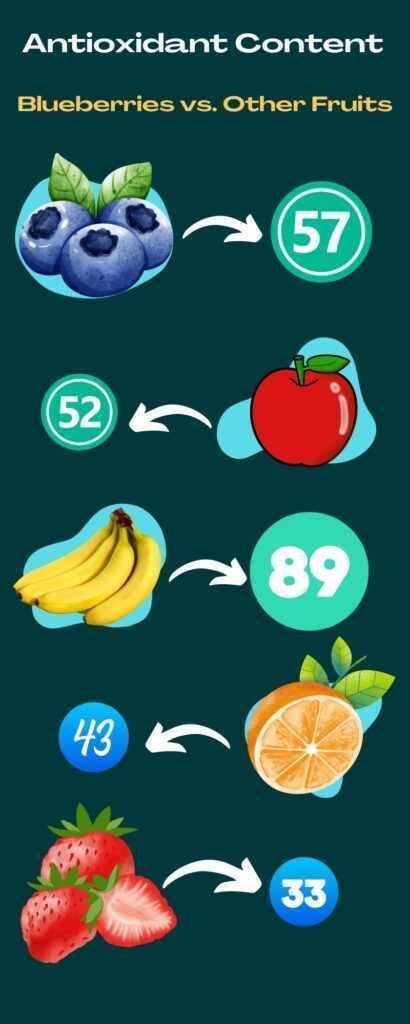Blueberries, often referred to as the “King of Antioxidant Foods,” are not just delightful to the palate but are also brimming with health benefits. Whether fresh, frozen, or dried, these berries have been the subject of numerous scientific studies, all pointing to their incredible nutritional profile. Let’s embark on a comprehensive exploration of the myriad benefits of this superfood.
1. A Powerhouse of Antioxidants
Often hailed as the “crown jewels” of the fruit kingdom, blueberries are particularly celebrated for their rich antioxidant content. These tiny, deep-blue orbs are a testament to the adage that good things come in small packages. As we delve deeper into the world of blueberries, it becomes evident that their status as a powerhouse of antioxidants is not just a claim but a scientifically-backed truth, making them an essential addition to our diets.

What are Antioxidants?
Antioxidants are molecules that combat free radicals in our body. Free radicals are unstable molecules that can damage our cells, leading to oxidative stress, a precursor to many chronic diseases.
Anthocyanins: The Star Compound
Blueberries are particularly rich in a group of flavonoids called anthocyanins. These compounds not only give blueberries their characteristic blue hue but also have potent antioxidant properties. They neutralize harmful free radicals, thereby preventing cellular damage.
Comparative Analysis with Other Foods
When compared to other fruits and vegetables, blueberries consistently rank high in terms of antioxidant activity. This means, gram for gram, blueberries offer one of the most effective natural defenses against oxidative stress. The table below provides a snapshot of how blueberries compare with other fruits in terms of nutritional content and health benefits. It’s essential to note that all fruits have their unique set of benefits, and variety is key to a balanced diet.
| Benefit/Property | Blueberries | Strawberries | Apples | Bananas | Oranges |
|---|---|---|---|---|---|
| Calories (per 100g) | 57 | 33 | 52 | 89 | 43 |
| Antioxidant Content | Very High (Rich in anthocyanins) | High (Rich in ellagic acid) | Moderate (Rich in quercetin) | Low | High (Rich in hesperidin) |
| Vitamin C (per 100g) | 9.7 mg | 58.8 mg | 4.6 mg | 8.7 mg | 53.2 mg |
| Dietary Fiber (per 100g) | 2.4g | 2.0g | 2.4g | 2.6g | 2.3g |
| Potassium (per 100g) | 77 mg | 153 mg | 107 mg | 358 mg | 181 mg |
| Heart Health Benefits | Reduces LDL cholesterol & blood pressure | Reduces LDL cholesterol | Reduces cholesterol | Regulates blood pressure | Reduces blood pressure |
| Brain Health Benefits | Enhances memory & cognitive function | Protects neuronal functions | Boosts brain health | Provides energy for brain function | Protects against cognitive decline |
| Digestive Health | Promotes healthy digestion | Supports gut health | Aids in digestion | Regulates bowel movement | Promotes digestive health |
| Skin Health Benefits | Protects against aging & sun damage | UV protection & anti-aging | Hydrates & brightens skin | Moisturizes & treats acne | Boosts collagen & hydrates |
2. Boosting Brain Health
Blueberries have emerged as a champion for brain health, thanks to their rich content of antioxidants, particularly anthocyanins.
Memory Enhancement
Several studies have shown that blueberries can improve memory and cognitive function. The antioxidants in blueberries protect the brain from oxidative stress and reduce inflammation, promoting neuronal signaling and improving brain function.
Neuroprotection
Blueberries have compounds that delay brain aging and neurodegenerative diseases. They promote neuroplasticity, which is the brain’s ability to reorganize itself, forming new neural connections throughout life.
Mood Regulation
Emerging research suggests that blueberries might play a role in mood regulation, potentially offering benefits for conditions like depression and anxiety.

3. Championing Heart Health

These tiny, vibrant berries, often celebrated for their delightful taste, are also powerhouses of nutrients that offer a robust defense against cardiovascular diseases. As modern science delves deeper into the heart-protective benefits of blueberries, it’s becoming clear that incorporating these berries into our diet is not just a treat for the palate, but a boon for the heart. Join us as we explore how blueberries have emerged as nature’s heart health champion.
Cholesterol Regulation
Blueberries have been shown to reduce harmful LDL cholesterol levels, a significant risk factor for heart disease. The antioxidants in blueberries protect LDL cholesterol from oxidative damage, which is a critical step in the heart disease process.
Blood Pressure Management
Regular consumption of blueberries is linked to a reduction in blood pressure, a major risk factor for heart diseases.
Improving Endothelial Function
The endothelium is a layer of cells lining the interior of blood vessels. Blueberries enhance its function, which is crucial for cardiovascular health.
4. Digestive Health Dynamo
One of the lesser-known yet equally significant advantages of these tiny, vibrant berries lies in promoting digestive health. Packed with dietary fiber and essential nutrients, blueberries not only tantalize our taste buds but also play a pivotal role in ensuring a smooth and efficient digestive process. As we delve deeper into the world of blueberries, we’ll uncover how they truly stand out as a digestive health dynamo, supporting our gut and enhancing overall well-being.
Rich in Dietary Fiber
Blueberries are a good source of dietary fiber, which aids in digestion. Fiber adds bulk to the stool, preventing constipation and promoting a healthy gut.
Gut Microbiota and Blueberries
Recent studies suggest that blueberries can positively influence the gut microbiota, fostering the growth of beneficial bacteria and enhancing gut health.
5. Skin’s Best Friend

In the realm of natural skincare, blueberries emerge as a silent yet potent champion. These tiny, vibrant berries, often celebrated for their internal health benefits, also hold the secret to radiant, youthful skin. Packed with a cocktail of antioxidants, vitamins, and essential nutrients, blueberries are not just a treat for the palate but a boon for the skin.
Combatting Signs of Aging
The vitamin C in blueberries aids in collagen production, vital for skin’s elasticity. Moreover, the antioxidants in blueberries reduce oxidative damage, one of the primary culprits behind skin aging.
Protection Against Sun Damage
Blueberries have compounds that can neutralize free radicals produced due to sun exposure, offering some degree of protection against sun damage.
6. Weight Management Companion
Low in calories yet bursting with essential nutrients, these tiny berries offer a delicious solution to those seeking flavorful ways to support their weight goals.

Low-Calorie Nutrient Density
Blueberries offer a unique combination: they’re low in calories but incredibly nutrient-dense. This makes them an ideal snack for those looking to shed some pounds without compromising on nutrition.
Satiety and Digestion
The dietary fiber in blueberries promotes feelings of fullness, reducing overall calorie intake.
7. Muscle Recovery and Exercise
Blueberries are emerging as a favorite among athletes and fitness enthusiasts. Their ability to combat oxidative stress and reduce muscle soreness positions them as a natural supplement for enhanced muscle recovery and improved exercise performance.
Anti-inflammatory Properties
Post-exercise, muscles undergo inflammation and oxidative stress. The anti-inflammatory properties of blueberries can aid in faster muscle recovery.
Enhancing Exercise Performance
Some studies suggest that blueberries can increase muscle oxygenation, potentially enhancing exercise performance.
Frozen Blueberries: Not Just for Smoothies
While many might associate these frost-kissed gems primarily with smoothies, their benefits extend far beyond being a mere blender ingredient. Retaining much of the nutritional prowess of their fresh counterparts, frozen blueberries offer a convenient and potent source of health benefits, ensuring that the goodness of this superfood is available year-round.

Retaining Nutritional Value
A common misconception is that frozen blueberries are nutritionally inferior to their fresh counterparts. However, the freezing process can actually preserve many of the berries’ essential nutrients, especially the antioxidants.
Convenience and Availability
Frozen blueberries offer the advantage of year-round availability. They’re also pre-washed and ready to use, making them a convenient option for quick meals and snacks.
Cost-Effective
In many regions, frozen blueberries can be more cost-effective than fresh ones, especially outside the blueberry season.
Dried Blueberries: A Nutrient-Dense Snack
Dried blueberries, with their concentrated taste and enhanced shelf life, offer a delightful blend of convenience and nutrition. These tiny, shriveled gems encapsulate the essence of the berry, providing a potent dose of nutrients in every bite. Perfect for on-the-go snacking, baking, or simply sprinkling over your morning oatmeal, dried blueberries are a testament to the fact that great things often come in small packages.

Concentrated Flavor and Nutrients
The process of drying blueberries concentrates both their flavor and nutrients, making them a potent source of antioxidants in a small serving.
Versatility in Dishes
Dried blueberries can be incorporated into a variety of dishes, from oatmeal and cereals to baked goods and salads, adding a burst of flavor and nutrition.
Shelf Stability
Dried blueberries have a longer shelf life compared to fresh or frozen blueberries, making them an excellent option for long-term storage without compromising on the nutritional benefits.
Wrap Up
Blueberries, in all their forms—fresh, frozen, or dried—stand out as a nutritional marvel. Their versatility in dishes and the vast array of health benefits they offer make them a must-have in every pantry. As we’ve delved deep into the world of blueberries, it’s evident that these little berries offer big health advantages. So, the next time you enjoy these juicy berries, you’ll appreciate not just their taste but also the plethora of health benefits they bring to the table.
